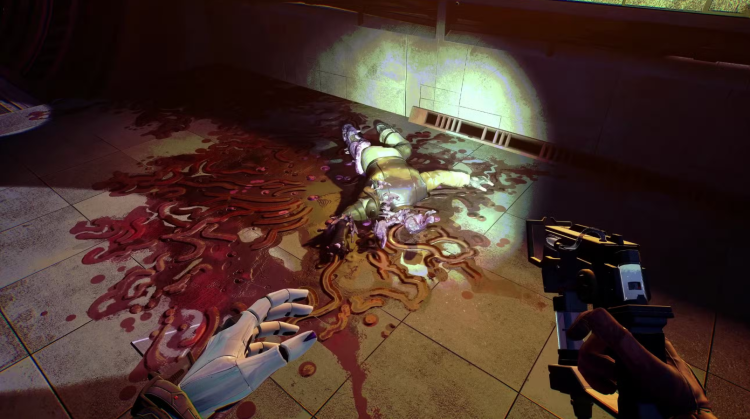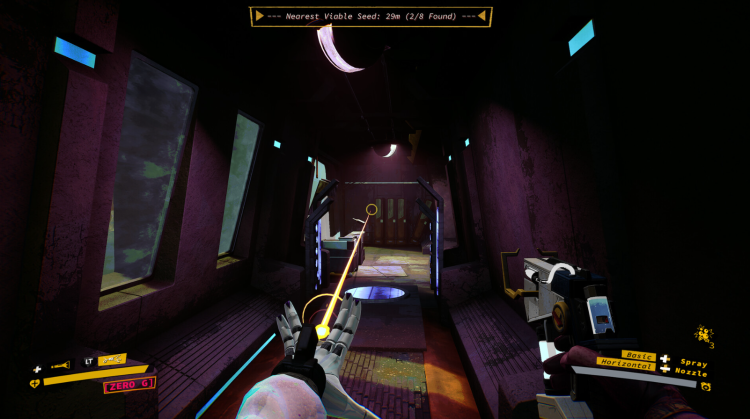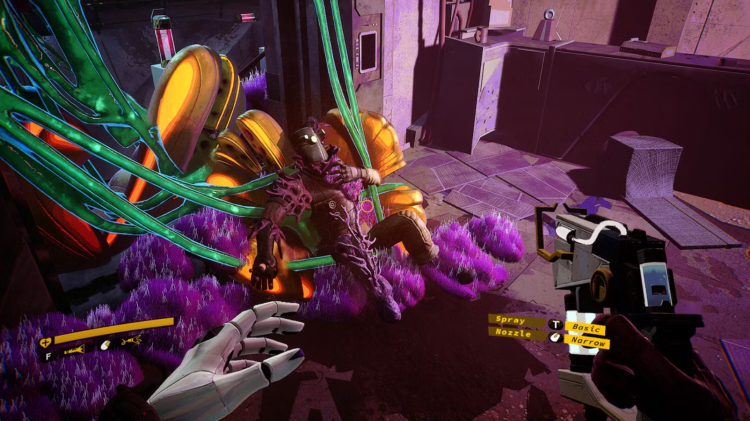Ambrosia Sky Launches November 10 as an Episodic Sci-Fi FPS Focused on Cleaning, Grief, and Discovery
The upcoming sci-fi first-person shooter Ambrosia Sky from indie studio Soft Rains is taking an unconventional route to release. After its striking debut during the Summer Game Fest showcase, the developer confirmed that the game will launch on November 10 as an episodic series rather than a full release. Players will begin their journey with Act One this year, while Acts Two and Three are expected sometime in 2026.
Soft Rains announced the change through a new trailer and a press release outlining its decision to divide Ambrosia Sky into three distinct acts. The studio described this approach as the best way to align with both the game’s narrative structure and the realities of its small-scale, self-published production.
“We felt this best fits the game’s unique narrative structure, the needs of our small production team, and our self-publishing goals,” said the Soft Rains team. “With Act One, players can experience a fully realized first chapter that is feature complete and uncompromised in both story and gameplay. It’s our way of offering a meaningful slice of what’s ahead, and we’re eager to share a roadmap soon to outline what’s planned for 2026.” — Soft Rains
While some fans expected a traditional single-release title, Soft Rains’ choice to go episodic allows it to expand the project in stages. The episodic rollout could help maintain a steady development cycle while allowing players to financially support the game’s continuation through early sales.
Act One will be available for PC on Steam, offering a complete experience designed as a self-contained chapter. A free demo is already live on the platform, giving players an early chance to test the game’s blend of methodical cleaning mechanics and narrative exploration.
Ambrosia Sky stands apart from conventional first-person shooters through its nonviolent premise. Players step into the role of Dalia Volkova, a field scientist known as a “scarab,” tasked with restoring contaminated environments in deep space. Her work centers on purifying areas overtaken by an alien fungus that has decimated life within Saturn’s rings. While Dalia’s mission officially concerns humanity’s pursuit of immortality through the Ambrosia Project, her personal journey dives deeper into themes of loss, memory, and reconnection with her past.
During an earlier interview, Soft Rains’ narrative director Kaitlin Tremblay described Ambrosia Sky as a science fiction story that prioritizes emotional intimacy over violence.
“She’s laying people to rest, which is always heavy,” Tremblay explained. “But she’s also grappling with her own feelings and what it’s like coming back to a hometown when you have all this unresolved stuff as an adult.” — Kaitlin Tremblay
In the game, Dalia must harvest DNA samples, cleanse fungal contamination, and perform rituals to honor the dead. Instead of fighting enemies, she listens to their final words, performing quiet acts of restoration and remembrance. Tremblay emphasized that this slower, more introspective tone was central to the team’s creative vision.
According to Tremblay and art director Adam Volker, Ambrosia Sky emerged from the idea of designing a first-person experience where the player acts as a scientist, not a soldier.
“Everything you do embodies this idea of being a scientist,” Tremblay said in an earlier discussion.
That includes environmental puzzle-solving and resource management rather than combat. The decision led the team to explore nontraditional mechanics for the genre — mechanics grounded in curiosity, empathy, and scientific observation rather than destruction.
The inspirations behind the game range from cosmic horror to environmental storytelling. Tremblay cited Jeff VanderMeer’s Annihilation as a major creative influence, particularly for its treatment of the unknown and its exploration of what it means to be human amid incomprehensible transformation. Volker, meanwhile, drew visual inspiration from NASA’s colorful planetary imagery, reimagining Saturn’s rings as a “boomed and busted truck stop along the Route 66 of space.” The world, according to Volker, needed to feel “like an abandoned community on a rock in the middle of the galaxy” — at once alien and intimately human.

Tremblay’s design also borrows from historical concepts of medicine and mortality. The “scarabs,” the monastic order to which Dalia belongs, are scientists pursuing immortality by studying death itself. Their project, dubbed the Ambrosia Project, seeks to decode and reverse cellular decay through the study of those who perished in outer space. Tremblay described them as “space witches” of science, fusing mysticism and biology in equal measure.
Dalia herself is portrayed as both insider and outsider to this order. She joined the scarabs to escape a difficult upbringing, not out of faith, making her perspective on the Ambrosia Project both skeptical and deeply personal. Tremblay designed Dalia’s characterization to come through the game’s mechanics as much as through dialogue. Every action the player performs — from cleaning fungal growth to cataloging the dead — reinforces Dalia’s identity as a scientist confronting her own trauma through work.
“If a player never reads a single terminal, somehow manages not to listen at all to the dialogue, do they still get a sense of who she is?” Tremblay asked. “For me, the answer is in the mechanics.” — Kaitlin Tremblay
Soft Rains built its narrative structure around the tension between control and vulnerability. Dalia’s calm professionalism occasionally breaks under the emotional strain of isolation. As players guide her through derelict space stations and fungal wastelands, they hear her record voice logs in the detached tone of a coroner — a veneer that gradually erodes as personal memories resurface.

Volker noted that the absence of combat does not make the experience lighter. Instead, it allows the emotional and philosophical aspects of the story to take center stage. The game uses solitude and introspection as storytelling tools, reflecting the loneliness of deep space and the human need to make peace with death.
From a design perspective, Ambrosia Sky integrates its mechanics directly into its themes. Players clean surfaces, collect samples, and uncover narrative fragments as part of their scientific duties. These actions unfold against the haunting backdrop of Saturn’s decaying settlements, evoking both wonder and melancholy. Each act promises to expand on Dalia’s story, offering new environments and revelations about the Ambrosia Project.
While Ambrosia Sky might resemble traditional sci-fi thrillers like The Thing or Alien, Soft Rains aims for something more reflective. The team described its focus as exploring endings — the endings of communities, of relationships, and of life itself — and how humans ritualize their attempts to make sense of them.

The decision to release Ambrosia Sky episodically ensures that each act receives the attention needed to tell its part of the story fully. Act One’s release on November 10 will serve as both an introduction to Dalia’s world and a test of Soft Rains’ experimental narrative approach. Players interested in the game can already download its demo from Steam to experience a sample of its atmospheric design and meditative gameplay.
With its blend of science fiction, ritual, and emotional storytelling, Ambrosia Sky seeks to expand the boundaries of what a first-person shooter can be. Rather than centering on combat, Soft Rains’ debut project invites players to confront the aftermath of death, the weight of memory, and the quiet dignity of cleaning what remains.
Ambrosia Sky launches November 10 for PC via Steam. Acts Two and Three are slated for release in 2026.

Comments